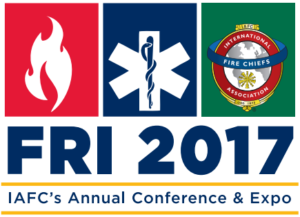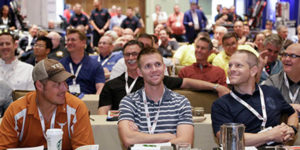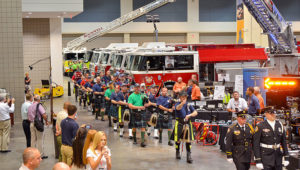By: Robert Avsec, Executive Fire Officer
Welcome home! You’ve just returned from a regional or national fire service conference—perhaps it was the recently concluded FRI 2017 in Charlotte, North Carolina—and now it’s your first day “back on the job”. What will you be doing?
recently concluded FRI 2017 in Charlotte, North Carolina—and now it’s your first day “back on the job”. What will you be doing?
Most likely, you’ll be “diving into” that mountain of work that’s accumulated in your in-boxes (both electronic and “snail mail” genres) and communicating with your direct reports to find out what’s happened while you were gone (That which you probably already know about thanks to your “electronic leash”, aka, your smartphone).
Fire Service Conference ROI
So, here’s my question: If your people could carry out the mission for those days you were away at that fire service conference or seminar or symposium, do they really need your time and attention on your first day back to work? (And why do we have three words that basically mean the same thing? Just asking). Perhaps a different question is in order: What were your reasons for attending said conference…in the first place?
- Networking for both you and your department? (Come on, we can be honest here, right?).
- Attending classes or presentations for your professional development?
- Engaging with vendors about future purchases?
In a piece I called, How to be a “Conference Commando” at FRI 2013, I mentioned two terms: ROMTI  (Return on My Time Invested) and ROTIIY (Return on Their Investment in You). The former is your personal time investment while the latter is the resource commitment from your bosses (travel expenses, conference fees, meals, etc.).
(Return on My Time Invested) and ROTIIY (Return on Their Investment in You). The former is your personal time investment while the latter is the resource commitment from your bosses (travel expenses, conference fees, meals, etc.).
After a Fire Service Conference
So, back to your first day (or first couple of days) on the job. Here are a couple of suggestions on how you can increase both your ROMTI and ROTIIY.
- Sit down with that smartphone or your computer and record a short video for your people describing your experience; call it a public “brain dump”. You’ve likely got a lot of things you could say, but stay focused on addressing the message, “What’s in it for me?”, from the perspective of your people. What did you learn or who did you meet or what vendors did you engage that can have a positive influence on you and your people and your department?
Perhaps a new program you learned about from another fire chief? Some new technology that will make life easier for your medics to record patient care information? An innovation in fire apparatus or communications technology or…any information that helps give your people the impression that their fire chief attended the conference and it was not an all-expense paid vacation.
life easier for your medics to record patient care information? An innovation in fire apparatus or communications technology or…any information that helps give your people the impression that their fire chief attended the conference and it was not an all-expense paid vacation.
Distribute that video as soon as possible to your fire stations and other work units along with an invitation for your personnel to send back any questions they have after watching the video. Record those questions and combine them with the information collected in the next suggestion.
- Sit down with your staff and have them conduct a “debriefing” session with you. Have one of your staff members serve as the facilitator who records your responses to questions asked by other staff members. Such a debriefing can serve as a type of “brainstorming” session that might lead to future projects for making improvements in your organization.
It can also serve as a powerful reinforcement tool: Hearing about how other fire and EMS departments have done things with success that your department has already done can give everyone a bit of a boost! (And who couldn’t use a little of that?)
- Schedule a work meeting with your staff in a couple of days to look back at the data collected in Steps 1 and 2 to see if there are any potential items that you and your staff feel should be pursued for making improvements in your department.
These three steps are more than just individual or group tasks. Collectively, they constitute leadership and mentoring on your part. By doing so, you’re creating expectations for attendance at future conferences by you and members of your department.
Knowing what those expectations look like can have a positive impact on how you and other members of your department when they attend conferences or seminars or symposia. And that will make all of you better “Conference Commandos!”
 Fire & EMS Leader Pro The job of old firefighters is to teach young firefighters how to become old firefighters!
Fire & EMS Leader Pro The job of old firefighters is to teach young firefighters how to become old firefighters!